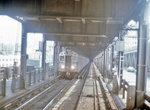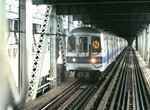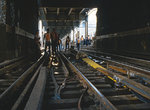Manhattan Bridge
Overview
The Manhattan Bridge serves as the main connection between the BMT subway lines of Brooklyn and the 6th Avenue and Broadway subway lines in Manhattan. There are four tracks on the bridge: two on the east (North) side and two on the west (South). There are three motor vehicle lanes between the sets of tracks, and two lanes above each set of tracks. The upper level lanes were originally four additional railway tracks, and in fact were once used for streetcar services over the bridge; use by elevated trains had been considered. The bridge thus was designed primarily for rail service.
The Manhattan side of the subway tracks originally were connected as follows: The north side tracks to the BMT Broadway Line at Canal Street; the south side tracks to the BMT Nassau Street-Jamaica Line subway north of Chambers Street. The south side tracks were used mostly during rush hour for services provided via the Nassau Street loop (which connected the BMT 4th Avenue Line and BMT Brighton Line to Manhattan via the Manhattan Bridge on the north end and the Montague Street tunnel on the south end). The configuration of the tracks at the Manhattan side was changed in 1967 as part of a large project known as the Chrystie Street connection. This project severed the connection to the under-used Nassau Street line on the south side. The south side tracks were then connected to the BMT Broadway Line, and the north side tracks connected via new construction to the IND 6th Avenue Line.
Travelling across the Manhattan Bridge results in about a 140-foot change in height/depth relative to the ground. The Grand Street station is approximately 50 feet below the street, while the peak of the bridge is approximately 90 feet above the water. DeKalb Avenue station is about 40 feet below the street.
The north side always had much more subway service, both when it carried Broadway trains (to 1967) and since, carrying 6th Ave. trains. The flexing caused by heavy trains, never desirable on a suspension bridge, has thus also been much greater on one side. The flexing caused severe structural damage requiring rehabilitation of the entire bridge. The original estimated total cost for the project was $314 million, with actual cost approaching $500 million. The bridge and construction projects are not under the control of MTA New York City Transit. None of the $12.7 billion committed to capital projects by the MTA between 1982 and 1993 (or since) has gone to the bridge project. The Manhattan Bridge is owned by the City of New York, and the ongoing reconstruction is being funded and managed by the City and State.
The project, begun in the late 1980s, has caused various parts of the bridge to be removed from service for construction over time. In essence, two of the four subway tracks on the bridge have been out of service for the better part of the last 20 years. This brought about major changes to subway service, since NYCT had to cope with the halving of its Manhattan Bridge capacity. In 2004, the New York City Department of Transportation (NYCDOT) marked the completion of these extensive repairs, and NYCT restored four-track service on February 22, 2004.
Subway service patterns changed more than once to allow for this construction. First, BMT service across the south side of the bridge was suspended (New Yorkers were subjected to the dreaded word "indefinitely," as the N train was restricted to local service via the Montague Tunnel and the Broadway Express disappeared, leaving only "All Service on Opposite Track" signs above the platform and steadily growing piles of garbage in the abandoned express tracks).
In the summer of 2001, the NYC DOT completed the installation of steel braces on the south side of the bridge, designed to reduce the train-induced twisting and prevent cracking of various structural elements. Broadway Express service then resumed over the south side, and the north side was closed to repeat the process there, forcing 6th Avenue trains using the bridge to terminate at 34th Street Station.
During periods when only the south side's BMT tracks were in service, there was no connection from the IND 6th Avenue subway to Brooklyn via the Bridge. Therefore, services that would normally operate to Brooklyn, namely the "B" and "D" trains, operated as a split service, with the Bronx/Manhattan half terminating at 34th St., where transfer could be made to the Broadway Bridge services. Prior to 2001, south side operations used the "B" and "D" indicators for both north and south halves of the service. For the 2001-2004 south side operations, the MTA decided to rename the Brooklyn services to "Q" and "W" in an attempt to minimize confusion. The "W" provided another function: It operated on the center express track on the Astoria elevated line to the Ditmars Blvd. terminal.
Maps
- The Chrystie Street Connection - Williamsburg Bridge-6th Avenue
- Manhattan Bridge Tracks Post-Chrystie St.
- Manhattan Bridge Tracks Pre-Chrystie St.
- Brooklyn Side - DeKalb Avenue
Bridge Services
The table below is a quick summary of services before, during, and after the bridge reconstruction.
| Service | Manhattan Side | Brooklyn Side | Bridge Side |
|---|---|---|---|
| Before Construction - Both Sides Open | |||

| IND 6th Avenue Line | BMT 4th Avenue Line/BMT West End Line | North |

| IND 6th Avenue Line | BMT Brighton Line | North |

| BMT Broadway Line | BMT 4th Avenue Line/BMT Sea Beach Line | South |

| BMT Broadway Line | BMT Brighton Line | South |
| Service with North Side Open | |||

| IND 6th Avenue Line | BMT 4th Avenue Line/BMT West End Line | North |

| IND 6th Avenue Line | BMT Brighton Line | North |

| IND 6th Avenue Line | BMT Brighton Line | North |
| Service with South Side Open | |||

| BMT Broadway Line | BMT Brighton Line | South |

| BMT Broadway Line | BMT Brighton Line | South |

| BMT Broadway Line | BMT Brighton Line/BMT West End Line | South |
| After Construction - Both Sides Open | |||

| IND 6th Avenue Line | BMT Brighton Line | North |

| IND 6th Avenue Line | BMT 4th Avenue Line/BMT West End Line | North |

| BMT Broadway Line | BMT 4th Avenue Line/BMT Sea Beach Line | South |

| BMT Broadway Line | BMT Brighton Line | South |
Photo Gallery
| Five Random Images | ||||
 Image 7414 (121k, 1050x699) Photo by: Todd Glickman Location: Manhattan Bridge |  Image 48557 (211k, 1024x682) Photo by: Todd Glickman Location: Manhattan Bridge |  Image 86315 (56k, 864x576) Photo by: Bill Demo Location: Manhattan Bridge |  Image 108115 (205k, 1024x664) Collection of: John Barnes Location: Manhattan Bridge |  Image 116059 (292k, 1024x682) Collection of: Collection of nycsubway.org Location: Manhattan Bridge |